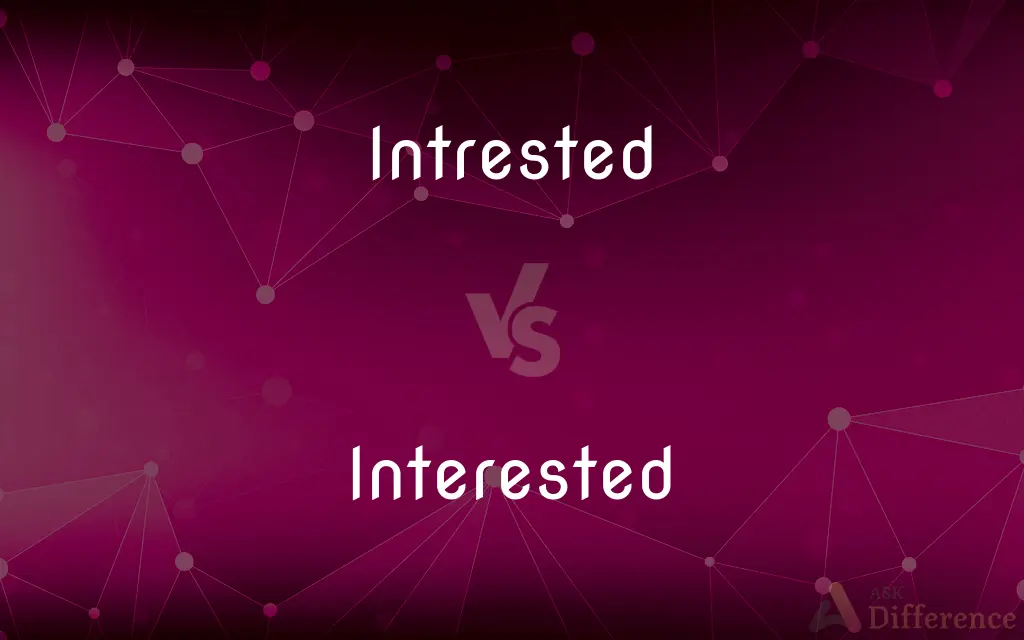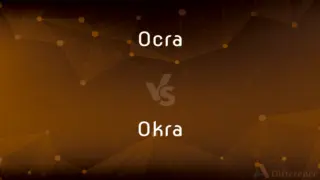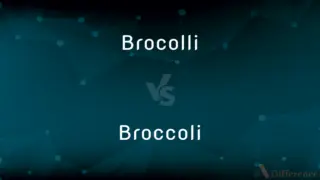Intrested vs. Interested — Which is Correct Spelling?
By Tayyaba Rehman — Updated on March 21, 2024
"Intrested" is an incorrect spelling. The correct form is "Interested," denoting curiosity or concern in something.

Table of Contents
Which is correct: Intrested or Interested
How to spell Interested?

Intrested
Incorrect Spelling

Interested
Correct Spelling
ADVERTISEMENT
Key Differences
"Interested" has two 'e's. Think "I am interested, hence two e's for me."
Remember that "interest" is spelled with an 'e' before the 'd.'
Associate the word with "enter," both have 'e' after 't.'
Recall "interest" as the base word; simply add 'ed' for "interested."
Visualize the phrase "I'm interested" to remember the placement of the two 'e's.
ADVERTISEMENT
How Do You Spell Interested Correctly?
Incorrect: He was not intrested in going to the museum.
Correct: He was not interested in going to the museum.
Incorrect: She seemed intrested in the science project.
Correct: She seemed interested in the science project.
Incorrect: Are you intrested in joining the book club?
Correct: Are you interested in joining the book club?
Incorrect: They were intrested in the new technology.
Correct: They were interested in the new technology.
Incorrect: I am very intrested in learning about ancient history.
Correct: I am very interested in learning about ancient history.
Interested Definitions
Affected or impacted by.
As an investor, he's interested in market changes.
Showing curiosity or concern about something.
She was deeply interested in the history of the place.
Exhibiting a feeling of intrigue or fascination.
She was interested in the mystery novel.
Eager to learn or hear more.
I'm interested to hear your perspective.
Having a personal stake or involvement.
He's interested in the company's success.
Having or showing curiosity, fascination, or concern
I'm interested to hear about your family.
Possessing a right, claim, or stake
An interested party in the estate. See Usage Note at disinterested.
Having or showing interest (attention or curiosity).
I'm very interested in going to see that play.
(less common) Having an interest (stake); being a stakeholder; motivated by considerations of self-interest; self-serving.
All interested parties [ ≈ all stakeholders]
Owning a share of a company; being a shareholder.
Simple past tense and past participle of interest
Having the attention engaged; having emotion or passion excited; as, an interested listener.
Having an interest; concerned in a cause or in consequences; liable to be affected or prejudiced; as, an interested witness; an interested party.
Having or showing interest; especially curiosity or fascination or concern;
An interested audience
Interested in sports
Was interested to hear about her family
Interested in knowing who was on the telephone
Interested spectators
Involved in or affected by or having a claim to or share in;
A memorandum to those concerned
An enterprise in which three men are concerned
Factors concerned in the rise and fall of epidemics
The interested parties met to discuss the business
Interested Meaning in a Sentence
They were interested in adopting a pet from the shelter.
Are you interested in playing soccer after school?
She's interested in studying marine biology.
I've always been interested in ancient Egyptian culture.
My brother is interested in collecting vintage comic books.
We're interested in exploring the national parks.
The children seemed interested in the story about pirates.
He became interested in cooking during the summer.
She was interested in finding out more about renewable energy.
Are you interested in joining us for a hike this weekend?
She's interested in learning how to play the guitar.
He's interested in studying the stars and planets.
He's interested in learning about different cultures through travel.
She became interested in environmental conservation efforts.
I'm interested in volunteering at the local food bank.
She's interested in writing her own novel one day.
She's interested in discovering new music and bands.
I'm interested in taking yoga classes to relax.
Are they interested in designing their own video game?
They were interested in learning different languages.
They're interested in building a community garden.
He's interested in participating in the science fair.
Are you interested in seeing the new superhero movie?
They became interested in bird watching while on vacation.
I'm interested in learning more about photography.
Interested Idioms & Phrases
Interested party
Someone who has a stake or concern in an issue or matter.
All interested parties are invited to the meeting to discuss the new city plan.
Common Curiosities
What is the root word of Interested?
The root word is "interest."
Which vowel is used before Interested?
The vowel "e" is used.
Which conjunction is used with Interested?
No specific conjunction is inherently tied to "Interested"; it depends on the context.
Why is it called Interested?
It's derived from the word "interest," indicating attention or concern.
What is the verb form of Interested?
The verb form is "interest."
What is the pronunciation of Interested?
Interested is pronounced as /ˈɪn.tər.ɛs.tɪd/.
Is Interested a noun or adjective?
"Interested" is an adjective.
Is Interested a collective noun?
No, it's not a noun.
Is the Interested term a metaphor?
No, but it can be used in metaphorical contexts.
Is the word Interested imperative?
No, "Interested" is not in the imperative form.
What is the singular form of Interested?
"Interested" is an adjective and doesn't have a singular form per se.
Is Interested an adverb?
No, "Interested" is not an adverb.
How do we divide Interested into syllables?
In-ter-est-ed.
Which determiner is used with Interested?
Determiners like "an," "my," and "this" can be used, depending on the context.
What is the plural form of Interested?
Adjectives like "interested" don't have plural forms.
Which preposition is used with Interested?
Commonly "in," as in "interested in."
Which article is used with Interested?
Usually "an," as in "an interested party."
Is Interested a vowel or consonant?
"Interested" is a word that contains both vowels and consonants.
Is Interested a countable noun?
No, "Interested" is not a noun, so it's not countable.
What is another term for Interested?
Another term is "intrigued."
What is the opposite of Interested?
The opposite is "disinterested" or "uninterested."
Is Interested a negative or positive word?
Neutral; its connotation can be either positive or negative based on context.
What part of speech is Interested?
"Interested" is an adjective.
What is the first form of Interested?
The base form is "interest."
What is the second form of Interested?
"Interested" itself is the past form of the verb "interest."
Is the word “Interested” a Direct object or an Indirect object?
"Interested" functions as an adjective, not as an object.
What is the third form of Interested?
"Interested" is also the past participle of "interest."
Is Interested an abstract noun?
No, it's an adjective.
Is the word Interested a Gerund?
No, but "interesting" can function as a gerund.
How many syllables are in Interested?
Four syllables.
What is a stressed syllable in Interested?
The second syllable, "ter," is stressed.
How is Interested used in a sentence?
"I'm interested in learning more about the topic."
Share Your Discovery

Previous Comparison
Ocra vs. Okra
Next Comparison
Brocolli vs. BroccoliAuthor Spotlight
Written by
Tayyaba RehmanTayyaba Rehman is a distinguished writer, currently serving as a primary contributor to askdifference.com. As a researcher in semantics and etymology, Tayyaba's passion for the complexity of languages and their distinctions has found a perfect home on the platform. Tayyaba delves into the intricacies of language, distinguishing between commonly confused words and phrases, thereby providing clarity for readers worldwide.














































